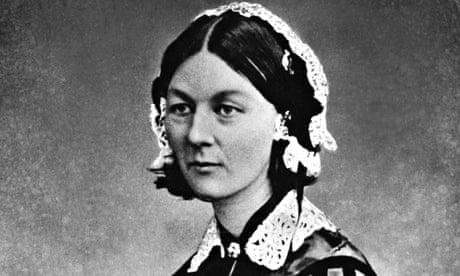A vast archive of letters from Florence Nightingale, many intensely personal and revealing about the woman usually seen as the shadowy Lady with the Lamp, is being brought together online and made freely accessible for the first time.
The originals of thousands of letters in which she discusses her life's work of medical reform, nursing training and hospital design – and also her anxieties, exhaustion, and the mysterious illness that kept her bedbound for years – are scattered in different institutions around the world, including the Florence Nightingale Museum, the Wellcome Collection in London, and the Howard Gotlieb Centre at Boston University, which have now brought their collections together online.
In 1850, Nightingale wrote that "my present life is suicide" because of the expectation that she would become a dutiful Victorian wife. In 1854, inspired by reports of appalling conditions for wounded British soldiers in the Crimean war, she took 38 nurses to Scutari, in Turkey.
Her sister said Nightingale's demanding nature made her a terrible nurse, but in 1856 she returned to England to find – to her horror – that newspaper accounts of her nightly ward rounds with a lantern had made her a national hero.
Within four years she launched into publishing Notes on Nursing, establishing a school for nurses at St Thomas' hospital, and sending nurses across the country to spread her views on training, hygiene and hospital organisation.
In August 1861, she wrote a briskly efficient letter addressed to "my dear friend" Mary Jones, superintendent of an Anglican sisterhood, who was setting up a convalescent hospital.
The first pages are practical advice: she discourses on building on gravel at Highgate, or sand and gravel at Blackheath, and the problem of a property suitable except that "the owner & his wife are the most extortionate & hypocritical people I ever had to deal with".
It suddenly turns into a torrent of grief over the death a week earlier of Sidney Herbert, who as head of the War Office had sent her to Scutari. He had remained her friend and political adviser, but his health collapsed; in a waspish biography soon after Nightingale's death, Lytton Strachey said her demands had killed him.
"His death was very sudden at last, rather unaccountable except by his having been injudiciously nursed, poor fellow," she wrote. "His last articulate words were for me."
Herbert was married, with seven children, but Nightingale wrote: "No one understood him but me. No one loved & served him like me. Ours was I think the soundest friendship I have ever heard of. It was founded solely on the love of mankind & of God, never on the pleasure of each other's society. All family loves do seem to me so selfish."
Natasha McEnroe, curator of the Florence Nightingale Museum, said that the project was still expanding as more institutions with her letters – totalling 19,000 by one count – join.
"Whether you are an academic, a family historian, or just interested in Victorian culture, this is an amazing opportunity to read Nightingale's thoughts in her own handwriting," McEnroe said. "There is something so immediate and intensely personal in seeing all the little clues in a letter – the crossings out and corrections, or even the black-edged writing paper used if she was in mourning."
Nightingale spent much of the rest of her long life confined to one room, and spent years in bed writing and dictating, sending for reports and documents and summoning people she wanted to see.
In 1873, Nightingale turned down a request from two ladies interested in her work: "This is so very busy a time of year for me: Matrons & Nurses going & coming: as well as Probationers: besides other business – sick ones in the house. 8 Nurses I have one after the other some days. & preach a special little lesson to each. And I am entirely a prisoner to my bed. I trouble you with these details: because 'my poverty' (of strength) '& not my will 'consents' to being deprived of the pleasure of seeing you."
By 1897 she was no more gregarious, writing to thank Lady Alicia Blackwood for a book but explaining that she was "now in my 77th year & almost entirely a prisoner to my room from illness". It must have struck her that Blackwood might remember Nightingale had now outlived her ostensibly more robust sister, and she added a PS: "Yes, indeed, I do think how I have survived all my near relations – & more than that survived the two men, Sidney Herbert & Lord Stanley, who conducted the two Royal Commissions which have done all the good in the Army".
She would write hundreds more letters and lived until 1910, awarded the Order of Merit in 1907 at the age of 87, and brought flowers by the German ambassador at the order of the emperor, both apparently presented as she lay propped up in bed.

Comments (…)
Sign in or create your Guardian account to join the discussion